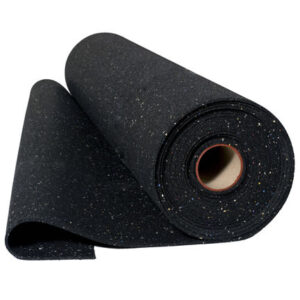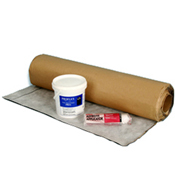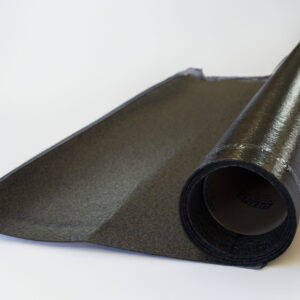Frequently Asked Questions
Consider these common questions to learn more about our soundproofing underlayment for floors and how it can benefit you.
What Underlayment Is Best for Soundproofing?
Impact Barrier QT™ from Soundproof Cow is the best flooring underlayment for soundproofing. Our flooring acoustic underlayment is designed for use in any room of the house or office.
Impact Barrier QT™ flooring underlayment offers numerous benefits, including:
- Noise reduction: Roll this material under your floors to soften footsteps and reduce noise transfer.
- Code compliance: Update your flooring with confidence that it meets all building codes.
- Ease of installation: roll out the underlayment and cut it to size before installation beneath any glued, grouted or floating floor.
- Environmental safety: Reduce your environmental footprint using a non-toxic material comprising 92% recycled rubber.
- Versatility: Customize your underlayment’s performance by choosing between light-, medium- and high-density variations.
How Do I Reduce Footstep Noise From Upstairs?
Flooring underlayment can reduce the noise you hear coming from upstairs. Noise transfers between floors through the air or by causing structural vibrations. If you have access to the floor upstairs, you can install flooring underlayment beneath any rug or hard floor to provide a cushion and block noise transfer. Otherwise, consider placing acoustic panels on your ceiling.
How Do I Stop Sound Traveling Through My Floor?
If you live or work above other people, they’ll thank you for reducing the amount of noise that passes through the floors. Some sound is bound to make it downstairs, whether it’s your footsteps, music or conversation. You can prevent noise from reaching your downstairs neighbors by:
- Minimizing vibrations: Softening the floors will reduce vibrations. You can add a carpet or rug on top of a hard floor to start or install flooring underlayment as a cushion beneath your hard floors.
- Increasing density: Adding flooring underlayment will increase the amount of material that noise must pass through to reach the lower level. A single layer takes an edge off the noise transfer.
How Can I Reduce Noise In My House With Hardwood Floors?
Hardwood floors are susceptible to a wide range of noise issues. Fortunately, you can address thumping footsteps, creaking floorboards and pesky echoes. Try these tactics to reduce noise from your hardwood floors:
- Flooring underlayment and a rug: Lay down a layer of Impact Barrier QT™ acoustic floor underlayment and roll a rug over it to reduce noise from footsteps and absorb noise.
- Floor joist isolators: Remove some floorboards to expose the floor joists to place rubber floor joist isolators between the joists and subflooring to reduce vibrations and sound transmission.
Learn More About Soundproofing Floors
How to Soundproof Hardwood Floors
How to Soundproof Vinyl Floors
How to Soundproof Carpeted Floors
How to Soundproof An Attic Floor
Soundproof Floor Underlayment Guide






